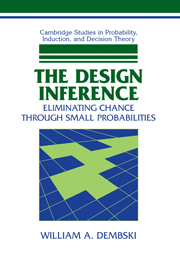Summary
HISTORICAL OVERVIEW
Eliminating chance through small probabilities has a long history. In his dialogue on the nature of the gods, Cicero (46 BC, p. 213) remarked, “If a countless number of copies of the one-and-twenty letters of the alphabet, made of gold or what you will, were thrown together into some receptacle and then shaken out on to the ground, [would it] be possible that they should produce the Annals of Ennius? … I doubt whether chance could possibly succeed in producing even a single verse!”
Eighteen centuries later the Marquis Pierre Simon de Laplace (1814, p. 1307) would question whether Cicero's method of randomly shaking out letters could produce even a single word: “On a table we see letters arranged in this order, Constantinople, and we judge that this arrangement is not the result of chance, not because it is less possible than the others, for if this word were not employed in any language we should not suspect it came from any particular cause, but this word being in use among us, it is incomparably more probable that some person has thus arranged the aforesaid letters than that this arrangement is due to chance.” A whole book, a single verse, nay, even a long word are so unlikely that we attribute their occurrence to something other than chance.
To show the absurdity of maintaining chance in the face of small probabilities Thomas Reid (1780, p. 52) asked: “If a man throws dies and both turn up aces, if he should throw 400 times, would chance throw up 400 aces?
Information
- Type
- Chapter
- Information
- The Design InferenceEliminating Chance through Small Probabilities, pp. 1 - 35Publisher: Cambridge University PressPrint publication year: 1998
